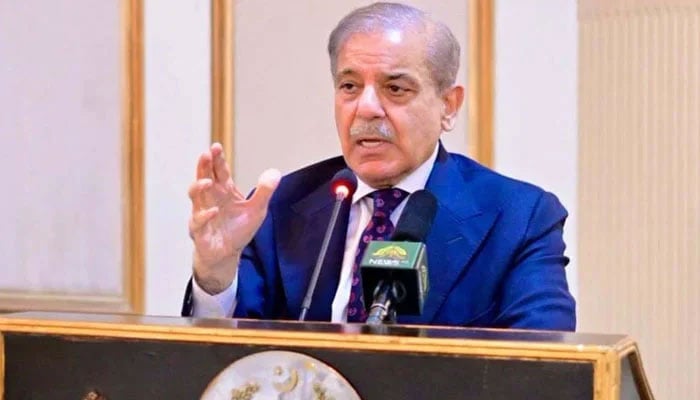PM rejects bid to link Pakistan to Pahalgam incident
Shehbaz says no evidence was shared with Pakistan and reiterated offer of an neutral investigation
LAHORE/ISLAMABAD/MOSCOW/NEW YORK: Prime Minister Shehbaz Sharif Sunday categorically rejected Indian bid to link Pakistan with the Pahalgam incident without sharing any evidence. He said this while talking with Malaysian Prime Minister Dato’ Seri Anwar Ibrahim over phone.
Shehbaz said no evidence was shared with Pakistan and reiterated Pakistan’s offer of an international, transparent, credible and neutral investigation to ascertain the facts behind the incident.
Shehbaz shared Pakistan’s serious concerns over the prevailing tensions in South Asia as a result of India’s provocative behaviour since the Pahalgam incident. He said Pakistan would welcome Malaysia’s participation in the investigation.
Emphasizing that Pakistan had always condemned terrorism in all its forms and manifestations, the prime minister highlighted Pakistan’s role as a frontline state in the war against terror and its tremendous sacrifices in this effort. India’s actions were distracting Pakistan from its counterterrorism efforts on its western border, he added.
He emphasized that it was unthinkable for Pakistan to involve in such a controversy particularly at a time when the country had just emerged out of a serious economic crisis and was back on the path towards economic stability.
The two prime ministers also exchanged views on Pakistan-Malaysia relations, reaffirming their shared commitment to strengthening bilateral ties and enhancing cooperation in various fields, including trade, investment and cultural exchanges.
In this context, the prime minister conveyed that he looked forward to paying an official visit to Malaysia later this year.
The two leaders underscored the close friendship and mutual understanding and agreed to remain in touch on regional and international developments.
In a related development, Deputy Prime Minister/ Foreign Minister Ishaq Dar Sunday apprised Russian Foreign Minister Sergey Lavrov of recent developments in the region and rejected India’s baseless allegations and inflammatory rhetoric against Pakistan.
During a telephonic conversation with the Russian foreign minister, Dar condemned India’s unilateral and illegal move to hold the Indus Waters Treaty (IWT) in abeyance in violation of its international obligations, says a statement issued by the Foreign Office.
Reiterating Pakistan’s commitment to regional peace, Dar emphasized that Pakistan would resolutely safeguard its sovereignty and national interests. He also conveyed Pakistan’s offer for an international transparent and independent investigation.
Lavrov expressed concern over the situation and stressed the importance of diplomacy to resolve issues. He emphasized that both sides should exercise restraint and avoid escalation. The two leaders also discussed the positive trajectory of Pak-Russia relations and reaffirmed their commitment to deepening cooperation across all sectors.
A diplomatic war between Pakistan and India is evident at the UN Headquarters in New York, as Pakistan has called for an emergency session of the UN Security Council, Azim M. Mian adds.
Pakistan’s Ambassador to the UN and his staff was busy on Sunday to initiate the procedural compliance needed to request for the council’s session, according to sources.
The initiative was taken following Foreign Minister Ishaq Dar’s directive to the ambassador.
Pakistan, itself is currently a member of 15-member UNSC until December 31, 2026, can play more effective role in the Council.
After meeting the UN general secretary general twice, Ambassador Asim Iftekhar Ahmad will start meeting with the envoys of other 14 countries, including Five Permanent members of the Council — USA, China, Russia, UK and France.
If no political or technical glitch is initiated by any permanent Member of the Council, then it is very likely that the UNSC may hold its session on India-Pakistan tensions in the South Asia region.
Amid the tense situation in the wake of Pahalgam incident, Iranian Foreign Minister Seyyed Abbas Araghchi will visit Pakistan on Monday (today).
This high-level visit reflects the deep-rooted and strong relationship between Pakistan and the brotherly nation of Iran. It also underscores the two countries’ shared commitment to strengthening bilateral cooperation across all areas of mutual interest. The two sides will also exchange views on regional and global developments, says the Foreign Office in a statement.
Araghchi will call on President Asif Ali Zardari, Prime Minister Muhammad Shehbaz Sharif and Deputy Prime Minister and Foreign Minister Senator Mohammad Ishaq Dar.
Pakistan and Iran enjoy close bilateral relations rooted in shared history, culture, and religion. The visit of Foreign Minister Araghchi is expected to further strengthen the existing ties and enhance cooperation between the two countries.
Meanwhile, Prime Minister Shehbaz Sharif Sunday met Pakistan Muslim League-Nawaz (PMLN) President Nawaz Sharif to deliberate on key national issues, including the country’s economic challenges and rising tensions with India. The meeting was held at the Sharif family residence in Jati Umra, Raiwind, according to the party sources.
The leaders reportedly assessed the current political landscape and the implications of regional developments, particularly the fallout of the attack in IIOJ&K and subsequent diplomatic strain.
Meanwhile, Pakistan’s Ambassador to Russia Muhammad Khalid Jamali has warned that Islamabad would respond with the “full spectrum of power” — including nuclear weapons — to what he described as inflammatory media commentary and “irresponsible statements” emanating from India. Jamali’s remarks were made during an interview with Russia’s state-controlled broadcaster RT.
In his interview, a short video of which was posted on X by Margarita Simonyan, editor-in-chief of RT, Jamali said, “You know the frenzy media of India and the irresponsible statements coming out from that side. There are other leaked documents indicating that it has been decided to strike certain areas of Pakistan. So that makes us feel that it is going to happen, and that it is imminent. And as I said, knowing the Pakistani nation and the armed forces of Pakistan, supported by the people of Pakistan, we are going to respond this time with the full spectrum of power.”
Simonyan further quoted Jamali as saying that Pakistan was prepared to use both “conventional and nuclear” weapons against India.
Meanwhile, Gulf Cooperation Council’s (GCC) Secretary General Jasem Mohamed Albudaiwi has expressed the member states’ grave concern over the worsening security situation in South Asia, urging for restraint and the prioritisation of dialogue, and the resumption of urgent negotiations between the Islamic Republic of Pakistan and the Republic of India.
In a statement, he underlined the importance of resorting to peaceful means to resolve disputes, in accordance with the principles of international law and the United Nations Charter, in order to maintain security, peace, and stability in the region.
Condemning the Pahalgam attack, he “reaffirmed the Council’s firm and principled position in rejecting terrorism in all its forms and manifestations”.
“In this context, he reiterated the member states’ call for the international community to enhance its efforts to find a peaceful solution to the Jammu and Kashmir issue, in accordance with the relevant United Nations Security Council resolutions.”
-
 Gracie Abrams Follows 'Kylie Jenner Playbook' With Paul Mescal Romance
Gracie Abrams Follows 'Kylie Jenner Playbook' With Paul Mescal Romance -
 Dua Lipa Shares 'Love Letter' With New Boyfriend After Emily Ratajkowski Confirms Romance With Her Previous Beau
Dua Lipa Shares 'Love Letter' With New Boyfriend After Emily Ratajkowski Confirms Romance With Her Previous Beau -
 Brazilian Beauty Influencer Passes Away After Suffering 'medical Emergency'
Brazilian Beauty Influencer Passes Away After Suffering 'medical Emergency' -
 Sarah Ferguson Turns Into A Bulldozer With Beatrice, Eugenie: ‘Help Me Out’
Sarah Ferguson Turns Into A Bulldozer With Beatrice, Eugenie: ‘Help Me Out’ -
 Australian Prime Minister's Letter Against Andrew Mountbatten-Windsor Made Public
Australian Prime Minister's Letter Against Andrew Mountbatten-Windsor Made Public -
 'Project Runway' Alum Tim Gunn Reveals Why He's Been Celibate For 43 Years
'Project Runway' Alum Tim Gunn Reveals Why He's Been Celibate For 43 Years -
 Delroy Lindo Breaks Silence On John Davidson's Racial Slur Shock At 2026 BAFTA: 'We Did What We Had To Do'
Delroy Lindo Breaks Silence On John Davidson's Racial Slur Shock At 2026 BAFTA: 'We Did What We Had To Do' -
 King Charles Prepares Next Move As Andrew Shows No Remorse
King Charles Prepares Next Move As Andrew Shows No Remorse -
 Epstein's Brother Invited To Discuss Royal Family's Future After Andrew's Arrest, On Popular Show
Epstein's Brother Invited To Discuss Royal Family's Future After Andrew's Arrest, On Popular Show -
 BAFTA Winner Robert Aramayo Defends Director's Racial Slurs Amid Tics
BAFTA Winner Robert Aramayo Defends Director's Racial Slurs Amid Tics -
 Prince William, Kate Middleton’s Troubles Take On A New Face: ‘They’re Steeling Themselves’
Prince William, Kate Middleton’s Troubles Take On A New Face: ‘They’re Steeling Themselves’ -
 'Coronation Street' Star Sally Ann Matthews Finally Reveals Why She Quit ITV Soap
'Coronation Street' Star Sally Ann Matthews Finally Reveals Why She Quit ITV Soap -
 Prince Andrew's Major Sacrifice For Princess Beatrice, Eugenie Royal Titles Revealed
Prince Andrew's Major Sacrifice For Princess Beatrice, Eugenie Royal Titles Revealed -
 ICE Agent Misfired Bullet Into Minnesota Hotel’s Guest Room
ICE Agent Misfired Bullet Into Minnesota Hotel’s Guest Room -
 Andrew Mountbatten-Windsor, Fergie Still Counting On Each Other? Deets
Andrew Mountbatten-Windsor, Fergie Still Counting On Each Other? Deets -
 Piers Morgan Reacts To Photo With Ghislaine Maxwell
Piers Morgan Reacts To Photo With Ghislaine Maxwell




